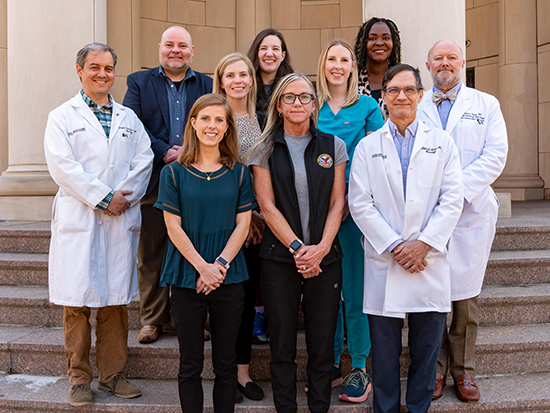 Front Row (left to right): Laurel Keller, Lindsey Rickles, Peter King, M.D.; Middle row (left to right): Joseph Daley, M.D., Ph.D., Carolyn Kesar, M.D., Caroline Johnson, Thomas Head, M.D.; Back row (left to right): Darren Kennemer, Sarah Alyce Williams, Kim RedwineThe Birmingham VA Medical Center Amyotrophic Lateral Sclerosis (ALS) Clinic has earned the designation of an ALS Association Certified Treatment Center of Excellence.
Front Row (left to right): Laurel Keller, Lindsey Rickles, Peter King, M.D.; Middle row (left to right): Joseph Daley, M.D., Ph.D., Carolyn Kesar, M.D., Caroline Johnson, Thomas Head, M.D.; Back row (left to right): Darren Kennemer, Sarah Alyce Williams, Kim RedwineThe Birmingham VA Medical Center Amyotrophic Lateral Sclerosis (ALS) Clinic has earned the designation of an ALS Association Certified Treatment Center of Excellence.
ALS is a progressive neurodegenerative disorder that affects motor neurons in the brain and spinal cord, leading to muscle weakness and paralysis.
The ALS Association's unanimous decision highlights the clinic's impressive research, collaborative spirit, and exceptional team dedication.
The Birmingham VA Medical Center ALS Clinic is directed by Peter King, M.D., professor and Vice Chair of Veterans Affairs in the UAB Department of Neurology. The Heersink School of Medicine communications team talked with King to learn more about this significant achievement and its impact on patient care and research advancements.
What does this certification mean for the clinic and its patients? How will it enhance the care provided to those with ALS?
King: It is an honor to be certified by the ALS Association as a Treatment Center of Excellence. The certification process is lengthy and rigorous, including an on-site evaluation by the senior ALSA director of clinical programs and an ALS physician from a certified clinic. Multiple criteria must be met to ensure a clinic meets the high standards set by the Association.
This includes active participation in ALS-focused research and educational initiatives. Only nine VA clinics across the country have received this designation. This certification will expand the referral base for veterans with ALS in the Southeast, as neurologists in other clinics and veterans will recognize this certification and trust the high-quality, comprehensive care provided. It also reflects a commitment to maintaining best clinical practices and staying connected with the latest treatment and supportive care research.
Could you elaborate on some of the key programs and services offered at the clinic that contributed to this recognition?
King: The VA provides the most comprehensive care for patients with ALS. Our veterans have access to various programs and services designed to enhance their quality of life and manage the many challenges posed by this disease. The multidisciplinary clinic offers extensive "one-stop" care, including physical and occupational therapy, speech pathology, pulmonary support, palliative care, social work, chaplaincy, and psychology. Veterans are eligible for skilled and unskilled home health care, hospice, caregiver support, housing and vehicle adaptations, and power wheelchairs.
Success of the clinic directly stems from the collaboration and cooperation of team members including VA physicians Drs. Joe Daley and Thomas Head from the UAB Department of Neurology and Dr. Carolyn Kesar from the UAB Department of Medicine, Division of Gerontology, Geriatrics and Palliative Care.
What unique challenges do veterans with ALS face, and how does the clinic address these challenges?
King: Veterans face nearly double the risk of developing ALS compared to the civilian population, though the cause remains unknown. Despite this uncertainty, our veterans deserve top-tier care. The VA has established a comprehensive support system for ALS patients. However, navigating the multitude of services can be overwhelming for veterans and their families, particularly as they confront the challenges of this debilitating disease.
Our clinic staff diligently guides veterans through available resources, providing clinical care coordination and intensive case management to address all their needs. To ensure seamless support, each veteran is assigned a designated contact person—a nurse, social worker, or other VA provider—available anytime to assist with any challenges.
How will the clinic continue to innovate and improve its services to meet the evolving needs of ALS patients?
King: Our dedicated care coordination team collaborates with our specialty providers, VA leadership, and ALS clinics across the VA system. This ensures our services reflect the most current approaches to ALS care and treatment, including access to clinical trials. The VA recognizes ALS as a service-connected disease, providing extensive resources to optimize care. Our team ensures these resources are readily available to veterans.
What are the clinic's future goals now that it has been recognized as a Center of Excellence?
King: We hope to expand our team and resources, including remote care options. A major advantage within the VA system is the ability to deliver patient care regardless of geographic boundaries. Utilizing telemedicine, our ALS clinic has expanded its reach to Florida, Mississippi, and Georgia clinics.
This certification will enable us to extend virtual care support to remote VA clinics lacking ALS expertise. Our future objective is to increase participation in clinical trials for novel treatments, a goal greatly facilitated by this certification. In 2021, Congress passed legislation to expedite access to critical therapies and therapeutic trials for ALS, heavily relying on virtual access due to the limited number of ALS centers nationwide. The VA, including the Birmingham VA, is uniquely positioned to meet this need with its established and successful virtual care platform.